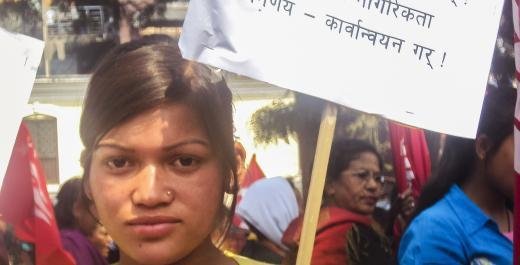KATHMANDU, Nepal (GPI)-- Pema Lama, 18, went abroad in good health in August 2010 to be a domestic worker in Kuwait, a country on the Persian Gulf, she says. But 20 months later, she returned with kidney and autoimmune diseases. Clad in jeans and a brown jacket with her hair tied back, Lama shows her doctor’s prescription from her routine checkups. “So many medicines have been prescribed, and I have taken them all,” Lama says. “I am not sure at all if I will be healthy again. I wish I could just die.” When she was 16 years old, she decided that, like many of her classmates, she wanted to leave school and her small village just northeast of Kathmandu, Nepal’s capital, to work abroad. Her parents, who survived on a meager income from farming, encouraged her with the hope that their lives would improve, she says. Her neighbors loaned her 40,000 rupees ($460) to pay for her foreign employment placement and airfare. She flew to Kuwait with the aid of a local employment agent, she says. The agent encouraged her when she applied for her passport to illegally claim to be 20 years old, an age more appealing to potential employers. “With the hope of fulfilling my dreams, I left my studies and migrated abroad on fake documents,” Lama says. She started working for a family of four in Kuwait, cleaning the house and caring for the children. After medical reports confirmed her health five days later, she started working in the kitchen. “I woke up at 5 in the morning and worked till 11 at night, like a machine,” Lama says. Her employers also paid her less than the contracted amount, she says. She gave her salary to an older Nepalese female worker in the neighborhood for safekeeping. When her employer’s wife found out, she kicked and slapped Lama. “Due to constant agony, I cried a lot every day, and I lost [my] appetite to eat food,” she says. Although she felt culturally isolated in Kuwait, she was not allowed to call her parents, she says. “There were so many things in my mind to give vent to,” Lama says. “I felt suffocated. As I couldn’t understand the language, I felt that a heavy stone was pressing my heart.” She also could not speak to the building’s landlord about the problems with her employers, she says. “I wanted to tell my problems to the landlady,” she says. “But because of [the] language barrier, I had to bear everything in silence.” She developed frequent headaches and a burning sensation in her hands and feet, she says. She fell down the stairs one day after becoming dizzy while cleaning the house’s windows and walls. Her back hurt because she stood the whole day, and her feet started to swell. Every morning, she craved for night, when she could go to bed. “I was scolded and beaten if I was ever seen taking rest,” she says with moist eyes. When her health condition prevented her from working, her employer took her to the doctor, but she could not understand the staff, Lama says. Soon, her employer sent her home in April 2012. “Gradually my health worsened, and soon I was bedridden,” she says. “When I couldn’t work, my employer packed me off to Nepal without giving the due monthly salary.” When she returned to Nepal, doctors diagnosed her with kidney disease and systemic lupus erythematosus, an autoimmune disease. But she could not pay for her medical treatment because she spent the 70,000 Nepalese rupees ($810) that she had saved from Kuwait repaying her loans and covering her mother’s medical treatment, she says. Then in November 2012, she discovered Pourakhi, a nongovernmental organization in Kathmandu that provides medical and psychological care to sick or hurt returnees. Pourakhi means “self-reliant” in Nepali. The organization is helping her to pay all her medical expenses, Lama says. “How else could I afford 6,000 rupees [$70] every month?” she asks. Illiteracy, poverty and a lack of employment opportunities compel Nepalese women to work abroad, but they often return home with lasting physical and mental injuries. Their families view their health issues as burdens and sometimes abandon them. Women who work abroad illegally are especially vulnerable to abuse because they forgo government training and support services. The government introduced age requirements for foreign employment in 2012 to better protect women, but some argue this has increased the number of women who work abroad illegally. To prevent this, nongovernmental organizations educate women about the potential dangers, and the government increasingly monitors fake documents and foreign employment trainings.
Advertisement















